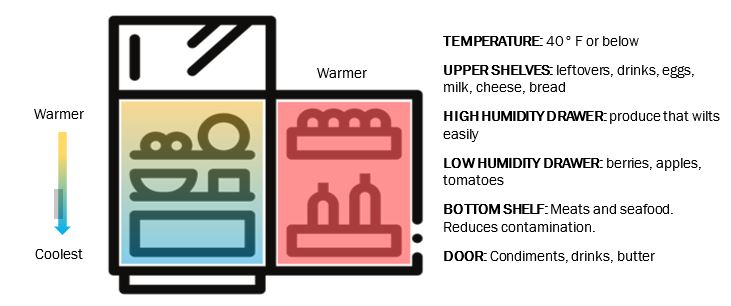Excessive food waste in Maine is a major contributor to climate change and an injustice because hundreds of thousands of children and adults don’t have access to healthy, quality food.
An astounding 40% of the food produced in the United States is wasted.1 Households are the single largest contributor to wasted food and are responsible for 37% of the problem.2
Climate Change & Food Waste
When uneaten food ends up in landfills, it decomposes and releases methane gas—which has 28-36%3 more heat-trapping capability than carbon dioxide.
If every Maine household cut their wasted food in half, it would be the greenhouse gas reduction equivalent of taking 119,000 cars off the road every year.4 According to Project Drawdown, as of October 2021, reducing food waste is the top strategy to limit the global release of greenhouse gases into the atmosphere.
Each year, the resources attributed to U.S. food loss and waste are equivalent to:
- 64 billion kWh energy – enough to power more than 50 million U.S. homes for a year; and
- 170 million MTCO2e greenhouse gas emissions (excluding landfill emissions) – equal to the annual CO2 emissions of 42 coal-fired power plants.
Food Insecurity & Wasted Food
35 million Americans, 166,910 Mainers including 44,520 kids, experienced food insecurity in 2019.5 We must work to make sure that perfectly good food is not wasted, and that any surplus food is feeding people and animals instead of our landfills or incinerators.
Maine Food Recovery Hierarchy Policy
The Natural Resources Council of Maine helped Maine adopt the food recovery hierarchy, which prioritizes the prevention of waste followed by feeding surplus food to people and animals, all before processing it for energy or composting. We support policies and programs that do all of those things and keep food (and all organic materials) out of our landfills.
Six Ways Mainers Can Prevent Wasted Food at Home
Here are six simple steps you can take to prevent food waste at home. Visit our toolkit to learn more, or get in touch with our Sustainable Maine team!
1. Do a little meal planning. You can save money and food by planning your meals a week in advance. Start by assessing what you already have and identify recipes you know you’ll make in the week ahead. When you’re ready to go shopping, buy only what your recipes need. You’ll probably find that you save money too. If you need help, try using a meal planning tool.
Pro-tip: We often toss out completely edible parts of the produce we buy. Slowly add recipes to your routine that use up these edible food scraps. Making soup stock is a classic example of how to utilize food scraps.
2. Know the truth about date labels. Most dates printed on foods do not have anything to do with food safety. These dates are loosely related to quality and are meant to help move product off the shelves and keep profits flowing. The best way to determine whether a food item is safe is to use your eyes and nose. If it doesn’t look or smell funny, it’s probably safe to eat.
3. Save the imperfect produce. We have been conditioned to choose “flawless” fruits and veggies when shopping, but imperfect or “ugly” fruits and veggies taste just as good and are equally nutritious. When we skip over imperfect produce, stores throw them out and they go to waste. You can help by purchasing the uglies. Chop and puree these overlooked products and taste their inner beauty!
4. Store food correctly. Your refrigerator has different temperature zones that you can use to your advantage to prolong the life of your foods. The coolest part of your refrigerator is the bottom shelf and the upper shelves and door are warmer:

5. Revive foods past their prime. Everyone makes mistakes in the kitchen. The good news is that foods are forgiving! Whether your food is wilted, too salty, stale, or overcooked, try these tricks to bring it back to life:
- Wilted: set in cold water. Ten minutes is enough, but overnight is best.
- Too salty: dilute with water, add a little vinegar or lemon, or soak it up with a potato/rice
- Stale: toast for a few minutes
- Overcooked or too ripe: puree for soups, sauces, or smoothies
- Burned: remove burned portion and save unburned part for a new recipe.
6. Compost uneaten food into soil. Kitchen scraps are great ingredients for soil. Composting them is one of the easiest ways to make sure they stay out of the landfill or away from the incinerator. There are lots of options available to Mainers, from composting at home, to participating in a compost service, or dropping off your food scraps at a local collection site in your town; often times towns partner with commercial composters or anaerobic digesters to offer this waste-reducing option to their residents. Learn more by visiting our Compost Toolkit. Once you’ve mastered reducing wasted food, share your experiences with your family, friends, and community, and let us know how it went!
2 https://refed.com/food-waste/the-challenge/#overview
3 https://www.epa.gov/lmop/basic-information-about-landfill-gas











